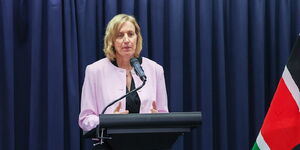The government, through the Kenya National Bureau of Statistics (KNBS), has launched a nationwide door-to-door data collection exercise aimed at gathering critical information to guide planning and policy decisions.
The exercise, referred to as the 2025/26 Kenya Integrated Household Budget Survey (KIHBS), officially began on July 16, 2025, and will run for a full year across all 47 counties.
According to KNBS, the purpose of the survey is to collect comprehensive data that will support national planning, policy development, and the monitoring of living standards, income distribution, and poverty levels.
The KIHBS will provide key indicators in areas such as demographics, education, health, employment, fertility and mortality rates, child nutrition, housing conditions, and household consumption patterns. It will also capture data on access to water, sanitation, and energy use, giving a broad view of the quality of life in different parts of the country.
To carry out the survey, trained enumerators will conduct face-to-face interviews in selected households. These enumerators will be equipped with tablet computers and will wear identification badges bearing QR codes, along with official introduction letters from KNBS for verification purposes.
The survey targets 24,480 scientifically sampled households and an additional 960 households in refugee camps, ensuring a comprehensive and inclusive collection of data that represents various regions and communities in Kenya.
KNBS has assured the public that all data collected will be treated with strict confidentiality and used solely for statistical purposes. The bureau urged all selected households to cooperate fully with enumerators and provide the information requested to ensure the success of the national exercise.
In its statement, KNBS stated the importance of public participation in the exercise, noting that the information gathered will directly influence national budgeting and the rollout of government development programs.
Meanwhile, in its previous survey released on May 6, the Kenya National Bureau of Statistics (KNBS) indicated that Kenyans are more likely to create their own jobs or find employment in the informal sector than in formal setups.
According to the data, Kenya’s economy created 782,300 new jobs in 2024, with the majority emerging from the private sector. However, this marked a 7.8 per cent drop compared to number of jobs created in 2023.
Of the total jobs created, 90 per cent were in the informal sector - encompassing small businesses, casual labour, and self-employment - which expanded by 4.2 per cent to reach 17.4 million workers. Despite this growth, the rate slowed compared to the previous year.
The formal sector, comprising regular wage-paying jobs, contributed 78,600 new positions. Wage employment in this sector rose by 2.4 per cent, bringing the total to approximately 3.2 million workers. Additionally, the number of self-employed individuals and unpaid family workers in the formal sector saw a slight increase.












